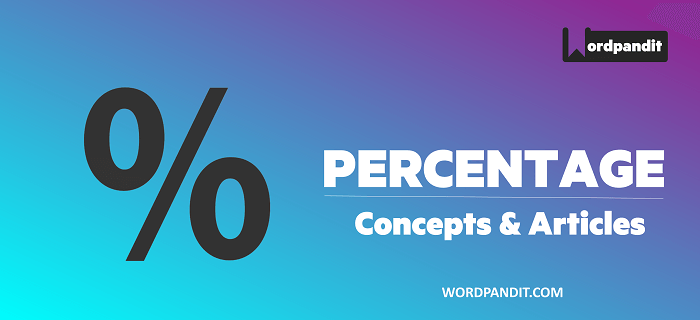In this article, we deal with topic of Product Constancy Ratio. This is essentially an application of percentages and can be quite useful while solving problems.
What is the Product Constancy Ratio?
In this concept, we essentially refer to the practice wherein two or more quantities make up a third quantity. With the variation in the numbers of one quantity, the other quantities need to undergo change in order to maintain the same product.
Let’s take an example.
Let there be two quantities A and B that multiply to form a quantity P. We can say:
A × B = P
Now if A is increased by a certain percentage, then B is required to be decreased by a certain percentage to keep the product P stable.
The following table illustrates the varying values of A and B that will maintain the same product P.
Application of Product Constancy: Expenditure Questions
If the price of a commodity increases or decreases by a%, then, the percentage decrease or increase in consumption, so as not to increase or decrease the expenditure is equal to:
(a/100+a) x 100%
Example: Length of a rectangle is increased by 33.33%. By what percentage should the breadth be decreased so that area remains constant?
Solution: Using the table above:
Since length is increased by 33.33%, the breadth will decrease by 25% to keep area constant.
Let’s make these calculations also.
Let original length= L
Original Breadth= B
Increase length= 4/3 L
Since the area remains same, we can say
L x B = Increased Breadth x 4/3L
Therefore,
Increased breadth = ¾ Original Breadth = 25% reduction in breadth.
Example: When speed of a car is increased by 25%, time taken reduces by 40 minutes in covering a certain distance.What is the actual time taken to cover the same distance by actual speed?
Solution: We have Speed × Time = Distance
Since speed has been increased by 25%, time will reduce by 20%.
Now, 20% of actual time = 40 min
Actual time = 200 min
Example: Price of a commodity has increased by 60%. By what percent must a consumer reduce the consumption of the commodity so as not to increase the expenditure ?
(a) 37%
(b) 37.5%
(c) 40.5%
(d) 60%
Percentages: The Complete Lesson
Table of Contents
Tests

